常用动词come
- 格式:doc
- 大小:85.50 KB
- 文档页数:11
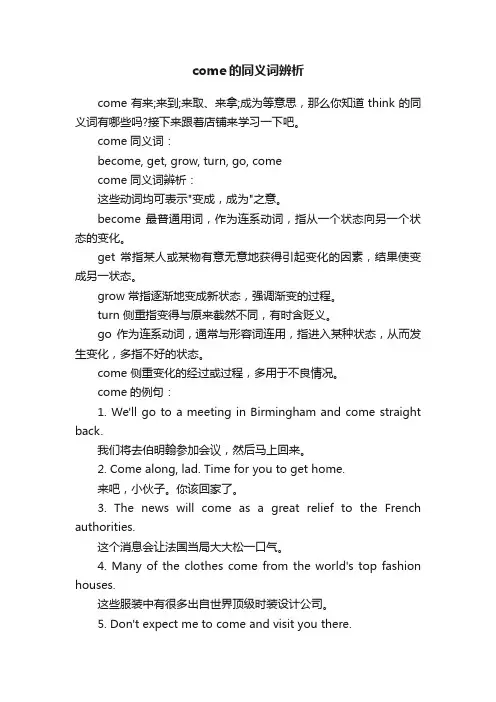
come的同义词辨析come有来;来到;来取、来拿;成为等意思,那么你知道think的同义词有哪些吗?接下来跟着店铺来学习一下吧。
come同义词:become, get, grow, turn, go, comecome同义词辨析:这些动词均可表示"变成,成为"之意。
become 最普通用词,作为连系动词,指从一个状态向另一个状态的变化。
get 常指某人或某物有意无意地获得引起变化的因素,结果使变成另一状态。
grow 常指逐渐地变成新状态,强调渐变的过程。
turn 侧重指变得与原来截然不同,有时含贬义。
go 作为连系动词,通常与形容词连用,指进入某种状态,从而发生变化,多指不好的状态。
come 侧重变化的经过或过程,多用于不良情况。
come的例句:1. We'll go to a meeting in Birmingham and come straight back.我们将去伯明翰参加会议,然后马上回来。
2. Come along, lad. Time for you to get home.来吧,小伙子。
你该回家了。
3. The news will come as a great relief to the French authorities.这个消息会让法国当局大大松一口气。
4. Many of the clothes come from the world's top fashion houses.这些服装中有很多出自世界顶级时装设计公司。
5. Don't expect me to come and visit you there.别指望我会去那儿看你。
6. Come on over, we've got lots of the old gang here.过来吧,好多老朋友都在这儿。
7. The final word will still come from the Secretary of State.最后仍然要由国务卿来定夺。
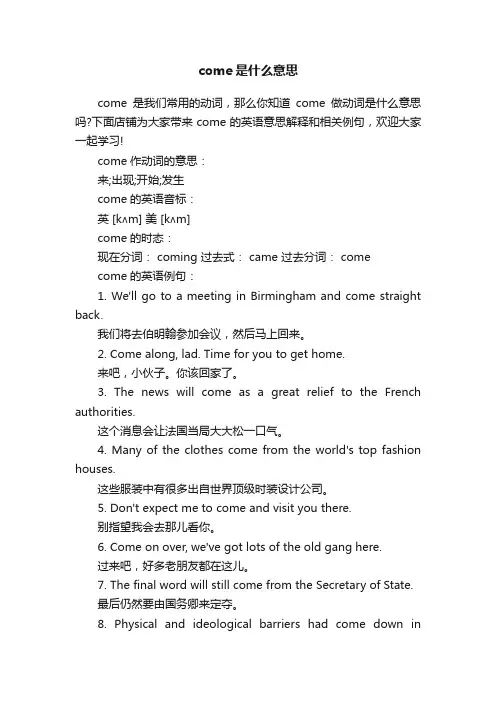
come是什么意思come是我们常用的动词,那么你知道come做动词是什么意思吗?下面店铺为大家带来come的英语意思解释和相关例句,欢迎大家一起学习!come作动词的意思:来;出现;开始;发生come的英语音标:英 [kʌm] 美 [kʌm]come的时态:现在分词: coming 过去式: came 过去分词: comecome的英语例句:1. We'll go to a meeting in Birmingham and come straight back.我们将去伯明翰参加会议,然后马上回来。
2. Come along, lad. Time for you to get home.来吧,小伙子。
你该回家了。
3. The news will come as a great relief to the French authorities.这个消息会让法国当局大大松一口气。
4. Many of the clothes come from the world's top fashion houses.这些服装中有很多出自世界顶级时装设计公司。
5. Don't expect me to come and visit you there.别指望我会去那儿看你。
6. Come on over, we've got lots of the old gang here.过来吧,好多老朋友都在这儿。
7. The final word will still come from the Secretary of State.最后仍然要由国务卿来定夺。
8. Physical and ideological barriers had come down inEastern Europe.物质和意识形态上的障碍在东欧已不复存在。
9. Rumours of financial scandals have come bubbling back to the surface.有关财务丑闻的谣言接连不断地冒出来。
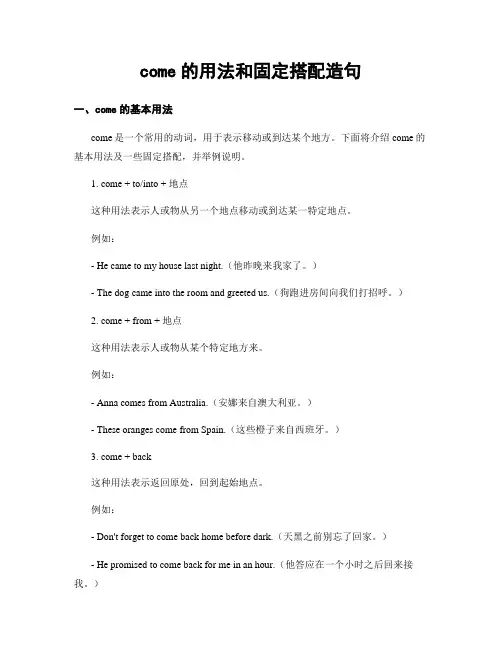
come的用法和固定搭配造句一、come的基本用法come是一个常用的动词,用于表示移动或到达某个地方。
下面将介绍come的基本用法及一些固定搭配,并举例说明。
1. come + to/into + 地点这种用法表示人或物从另一个地点移动或到达某一特定地点。
例如:- He came to my house last night.(他昨晚来我家了。
)- The dog came into the room and greeted us.(狗跑进房间向我们打招呼。
)2. come + from + 地点这种用法表示人或物从某个特定地方来。
例如:- Anna comes from Australia.(安娜来自澳大利亚。
)- These oranges come from Spain.(这些橙子来自西班牙。
)3. come + back这种用法表示返回原处,回到起始地点。
例如:- Don't forget to come back home before dark.(天黑之前别忘了回家。
)- He promised to come back for me in an hour.(他答应在一个小时之后回来接我。
)这种用法表示朝着谈话者走过来。
例如:- John saw me and came up to say hello.(约翰看见了我,走过来打招呼。
)- Can you come up here and help me carry these boxes?(你能上来帮我抬这些箱子吗?)5. come + along这种用法表示加入或一同前往某个地方。
例如:- Sarah, please come along with us to the party tonight.(莎拉,请和我们一起去参加今晚的派对。
)- The children came along on our family trip to the beach.(孩子们和我们一同去海滩度假。
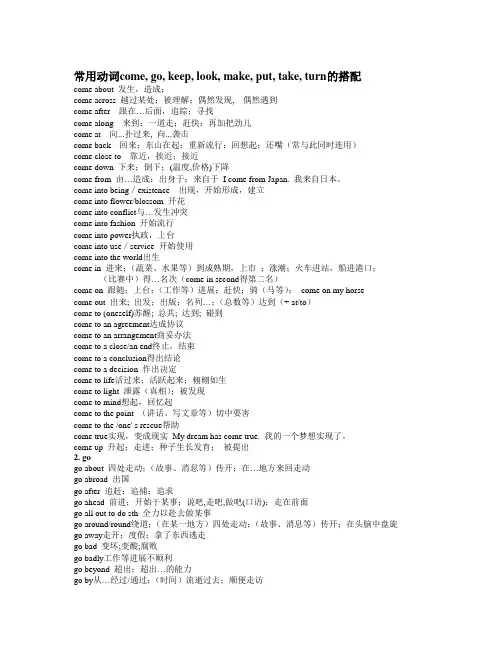
常用动词come, go, keep, look, make, put, take, turn的搭配come about 发生,造成;come across 越过某处;被理解;偶然发现,偶然遇到come after跟在…后面,追踪;寻找come along来到;一道走;赶快;再加把劲儿come at向...扑过来, 向...袭击come back回来;东山在起;重新流行;回想起;还嘴(常与此同时连用)come close to靠近,挨近;接近come down 下来;倒下;(温度,价格)下降come from 由…造成;出身于;来自于I come from Japan. 我来自日本。
come into being/existence出现,开始形成,建立come into flower/blossom 开花come into conflict与…发生冲突come into fashion 开始流行come into power执政,上台come into use/service 开始使用come into the world出生come in 进来;(蔬菜、水果等)到成熟期,上市;涨潮;火车进站,船进港口;(比赛中)得…名次(come in second得第二名)come on 跟随;上台;(工作等)进展;赶快;骑(马等);come on my horsecome out 出来; 出发;出版;名列…;(总数等)达到(+ at/to)come to (oneself)苏醒; 总共; 达到; 碰到come to an agreement达成协议come to an arrangement商妥办法come to a close/an end终止,结束come to a conclusion得出结论come to a decision 作出决定come to life活过来;活跃起来;栩栩如生come to light 泄露(真相);被发现come to mind想起,回忆起come to the point (讲话、写文章等)切中要害come to the /one' s rescue帮助come true实现,变成现实My dream has come true. 我的一个梦想实现了。
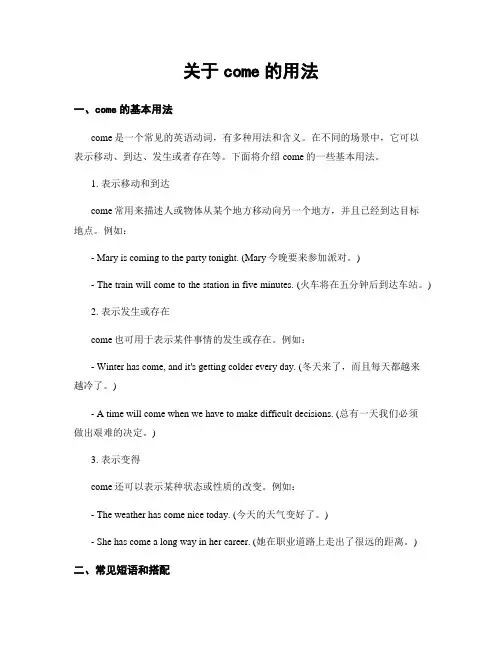
关于come的用法一、come的基本用法come是一个常见的英语动词,有多种用法和含义。
在不同的场景中,它可以表示移动、到达、发生或者存在等。
下面将介绍come的一些基本用法。
1. 表示移动和到达come常用来描述人或物体从某个地方移动向另一个地方,并且已经到达目标地点。
例如:- Mary is coming to the party tonight. (Mary今晚要来参加派对。
)- The train will come to the station in five minutes. (火车将在五分钟后到达车站。
)2. 表示发生或存在come也可用于表示某件事情的发生或存在。
例如:- Winter has come, and it's getting colder every day. (冬天来了,而且每天都越来越冷了。
)- A time will come when we have to make difficult decisions. (总有一天我们必须做出艰难的决定。
)3. 表示变得come还可以表示某种状态或性质的改变。
例如:- The weather has come nice today. (今天的天气变好了。
)- She has come a long way in her career. (她在职业道路上走出了很远的距离。
)二、常见短语和搭配除了基本用法之外,come还有许多常见短语和搭配,下面将列举几个常见的。
1. come up (with)表示提出(想法、解决方案等),或突然想起某事。
例如:- She came up with a brilliant idea for the project. (她为这个项目提出了一个绝妙的想法。
)- I can't come up with his name right now, but I'll remember it later. (我现在想不起他的名字,但我会记住的。
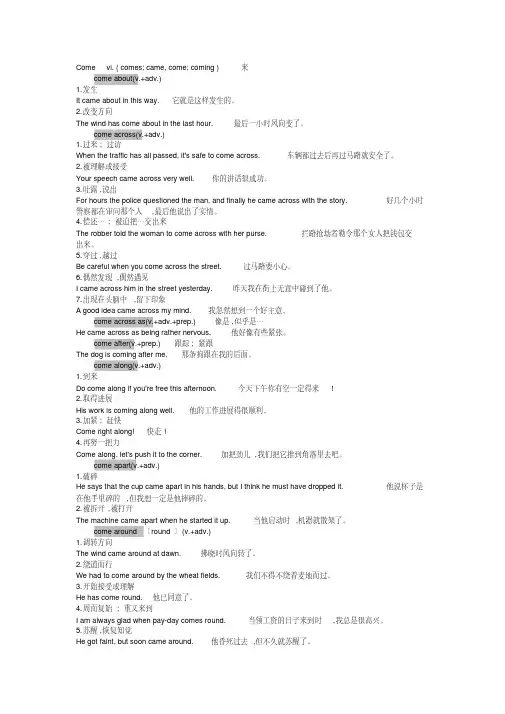
Come vi. ( comes; came, come; coming ) 来come about(v.+adv.)1.发生It came about in this way.它就是这样发生的。
2.改变方向The wind has come about in the last hour.最后一小时风向变了。
come across(v.+adv.)1.过来; 过访When the traffic has all passed, it's safe to come across.车辆都过去后再过马路就安全了。
2.被理解或接受Your speech came across very well.你的讲话很成功。
3.吐露,说出For hours the police questioned the man, and finally he came across with the story.好几个小时警察都在审问那个人,最后他说出了实情。
4.偿还…; 被迫把…交出来The robber told the woman to come across with her purse.拦路抢劫者勒令那个女人把钱包交出来。
5.穿过,越过Be careful when you come across the street.过马路要小心。
6.偶然发现,偶然遇见I came across him in the street yesterday.昨天我在街上无意中碰到了他。
7.出现在头脑中,留下印象A good idea came across my mind.我忽然想到一个好主意。
come across as(v.+adv.+prep.) 像是,似乎是…He came across as being rather nervous.他好像有些紧张。
come after(v.+prep.) 跟踪; 紧跟The dog is coming after me.那条狗跟在我的后面。
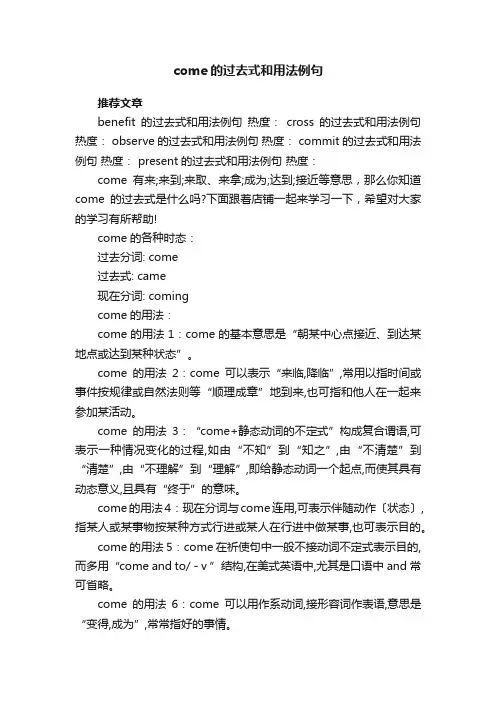
come的过去式和用法例句推荐文章benefit的过去式和用法例句热度:cross的过去式和用法例句热度: observe的过去式和用法例句热度: commit的过去式和用法例句热度: present的过去式和用法例句热度:come有来;来到;来取、来拿;成为;达到;接近等意思,那么你知道come的过去式是什么吗?下面跟着店铺一起来学习一下,希望对大家的学习有所帮助!come的各种时态:过去分词: come过去式: came现在分词: comingcome的用法:come的用法1:come的基本意思是“朝某中心点接近、到达某地点或达到某种状态”。
come的用法2:come可以表示“来临,降临”,常用以指时间或事件按规律或自然法则等“顺理成章”地到来,也可指和他人在一起来参加某活动。
come的用法3:“come+静态动词的不定式”构成复合谓语,可表示一种情况变化的过程,如由“不知”到“知之”,由“不清楚”到“清楚”,由“不理解”到“理解”,即给静态动词一个起点,而使其具有动态意义,且具有“终于”的意味。
come的用法4:现在分词与come连用,可表示伴随动作〔状态〕,指某人或某事物按某种方式行进或某人在行进中做某事,也可表示目的。
come的用法5:come在祈使句中一般不接动词不定式表示目的,而多用“come and to/ - v ”结构,在美式英语中,尤其是口语中and常可省略。
come的用法6:come可以用作系动词,接形容词作表语,意思是“变得,成为”,常常指好的事情。
come的用法7:come除在成语或谚语中外一般不用于被动结构,但其过去分词可和be连用构成系表结构。
come的用法8:come的进行时可表示按计划或安排即将发生的动作,这时一般有表示将来的时态或特定的上下文。
若表示过去将来的情况须用was/were coming,但come通常不用be going to结构。
come的用法9:come是非延续性动词,不与表示一段时间的状语连用。
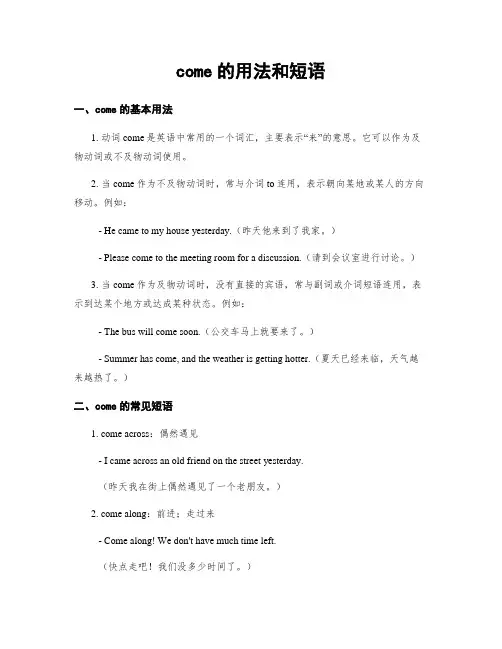
come的用法和短语一、come的基本用法1. 动词come是英语中常用的一个词汇,主要表示“来”的意思。
它可以作为及物动词或不及物动词使用。
2. 当come作为不及物动词时,常与介词to连用,表示朝向某地或某人的方向移动。
例如:- He came to my house yesterday.(昨天他来到了我家。
)- Please come to the meeting room for a discussion.(请到会议室进行讨论。
)3. 当come作为及物动词时,没有直接的宾语,常与副词或介词短语连用,表示到达某个地方或达成某种状态。
例如:- The bus will come soon.(公交车马上就要来了。
)- Summer has come, and the weather is getting hotter.(夏天已经来临,天气越来越热了。
)二、come的常见短语1. come across:偶然遇见- I came across an old friend on the street yesterday.(昨天我在街上偶然遇见了一个老朋友。
)2. come along:前进;走过来- Come along! We don't have much time left.(快点走吧!我们没多少时间了。
)3. come back:回来- She said she would come back tomorrow morning.(她说她明天早上回来。
)4. come down:下来;降落- The plane is coming down, get ready to land.(飞机正在降落,准备着陆。
)5. come forward:站出来;自告奋勇- Anyone with information about the incident is urged to come forward.(敦促有关这一事件的人站出来提供信息。
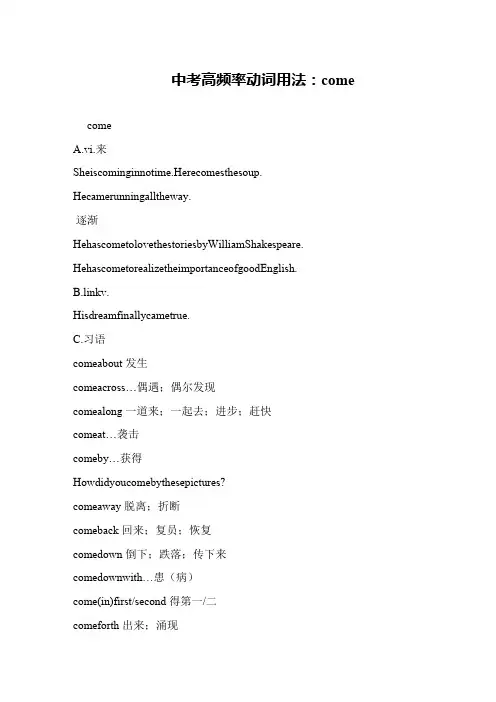
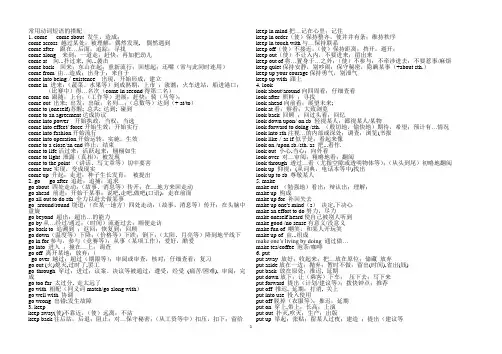
常用动词短语的搭配1. come come about 发生,造成;come across 越过某处;被理解;偶然发现,偶然遇到come after跟在…后面,追踪;寻找come along来到;一道走;赶快;再加把劲儿come at向...扑过来, 向...袭击come back回来;东山在起;重新流行;回想起;还嘴(常与此同时连用)come from 由…造成;出身于;来自于come into being/existence出现,开始形成,建立come in 进来;(蔬菜、水果等)到成熟期,上市;涨潮;火车进站,船进港口;(比赛中)得…名次(come in second得第二名)come on 跟随;上台;(工作等)进展;赶快;骑(马等);come out 出来; 出发;出版;名列…;(总数等)达到(+ at/to)come to (oneself)苏醒; 总共; 达到; 碰到come to an agreement达成协议come into power 开始执政,当权,当选come into effect/ force开始生效,开始实行come into fashion开始流行come into operation开始运转,实施,生效come to a close/an end终止,结束come to life活过来;活跃起来;栩栩如生come to light 泄露(真相);被发现come to the point (讲话、写文章等)切中要害come true实现,变成现实come up 升起;走进;种子生长发育;被提出2. go go after 追赶;追捕;追求go about 四处走动;(故事、消息等)传开;在…地方来回走动go ahead 前进;开始干某事;说吧,走吧,做吧(口语);走在前面go all out to do sth 全力以赴去做某事go around/round绕道;(在某一地方)四处走动;(故事、消息等)传开;在头脑中盘旋go beyond 超出;超出…的能力go by从…经过/通过;(时间)流逝过去;顺便走访go back to 追溯到;返回;恢复到;回顾go down(温度等)下降;(价格等)下跌;倒下;(太阳、月亮等)降到地平线下go in for参与,参与(竞赛等);从事(某项工作);爱好,酷爱go into 进入;撞在…上;调查go off 离开某地;放弃;(go over 越过;超过(期限等);审阅或审查,核对;仔细查看;复习go out (火)熄灭,过时了,罢工go through 穿过;进过;议案、决议等被通过;遭受,经受(痛苦/困难), 审阅;完成go too far 太过分, 走太远了go with 相配(同义词match/go along with)go well with 协调go wrong 出错;发生故障3. keepkeep away(使)不靠近,(使)远离;不沾keep back往后站,后退;阻止;对…保守秘密;(从工资等中)扣压,扣下;留给keep in mind把…记在心里;记住keep in order(使)保持整齐,使井井有条;维持秩序keep in touch with与…保持联系keep off(使)不接近,(使)保持距离;挡开,避开;keep out(使)不让入内,不要进来;留出来keep out of将…置身于…之外;(使)不参与;不牵涉进去;不要惹事/麻烦keep quiet保持安静,别吵闹;保守秘密,隐瞒某事(+about sth.)keep up your courage保持勇气,别泄气keep up with 跟上4. looklook about/around向四周看;仔细查看look after 照料;寻找look ahead向前看;展望未来;look at看;察看;大致浏览look back 回顾;回过头看;回忆look down upon/ on sb 轻视某人;鄙视某人/某物look forward to doing /sth. (殷切地,愉快地)期待,希望;预计有…情况look into sth注视…的内部或深处;调查;浏览(书报look like/as if似乎是;看起来像look on /upon sb./sth. as 把...看作.look out 小心,当心;向外看look over 对…审阅;粗略地看;翻阅look through 透过…看(尤指空隙或透明物体等);(从头到尾)初略地翻阅look up 仰视;(从词典,电话本等中)找出look up to sb 尊敬某人5. makemake out (勉强地)看出;辩认出;理解;make up 构成make up for 补回失去make up one's mind(s)决定,下决心make an effort to do努力,尽力make oneself heard使自己被别人听到make good /no sense有意义/没意义make fun of 嘲笑,和某人开玩笑make up of 由...组成make one’s living by doing 通过做…make tea/coffee 泡茶/咖啡6. putput away 放好;收起来;把…放在原位;储藏放弃put aside放在一边;抛弃;暂时不做;留出(时间),省出(钱)put back 放在原处;推迟, 延期put down放下;让(乘客)下车;压下去;写下来put forward 提出(计划/建议等);拨快钟点;推荐put off 推迟, 延期;打消, 关上put into use 投入使用put off脱掉(衣服等);推迟,延期put on 穿上,带上;长高;上演put out 扑灭,吹灭;生产;出版put up 举起;张贴;留某人过夜;建造;提出(建议等put up with和某人住在一起;忍受,忍耐put through 做成,完成;接通电话使通过考试;使经历(难受的事)put one's heart into 全心全意投入7. taketake away 拿走, 挪开,拿开;(使)离开,把某人带走take back 拿回来,退回;送回某人;(同意)收回(退货)take sb./sth. for granted认为…是必然情况,视为当然take part in参加take pride in =be proud of 引以为自豪take advantage of 利用;占…的便宜take care of照看,照顾take charge of开始负…的责;看管;控制take a chance 碰运气take hold of抓住;掌握take notice of对…注意/留心;认真地听take the opportunity of抓住机会;利用(机会)take the place of代替take the risk of冒…的险take off 拿开;去掉;(飞机)起飞;脱下(衣、帽等)take on a new look 呈现新面貌take up 占据(时间,地方);从事于take in吸收(气、水等);接纳(工作人员等);收集;骗take in turn 依次8. turnturn against 背叛;(使)事情对…不利;(使)攻击turn around/round转过身去,将…转过来;使(船、飞机等)返航turn down 拒绝;音量调低;向下翻;turn into 把...变成...;把...翻译成...turn in 上交turn left向走转turn off关掉(开关等);关闭,断开turn on打开(开关、水、电等)turn out制造出,生产出,培养出;结局是,结果是;原来是turn over 移交,把...打翻turn to 转向,求助于,翻到第几页turn to sb for help 求助于9.以break为中心的词组break away from 脱离,逃离,打破break down vt.破坏,粉碎,瓦解vi.出故障抛锚,衰弱break in 闯进,打断;使顺服break into 闯入;强行进入;突然开始break out 爆发,发生;准备使用;起锚break the law 违反法律break the record 破记录break one’s promise 失言10.以burst为中心的词组burst in 闯进,突然出现burst into 闯进,突然…起来,突然发出burst into tears / laughter 嚎啕大哭/放声大笑burst out 迸发,爆发,突然发出,大声叫喊burst out crying / laughing嚎啕大哭/放声大笑11..以bring为中心的词组bring about 导致,引起,促使bring down 使下降,浓缩,收缩,击落bring in 把..带进来,引进,挣得(收入)bring into action 使行动起来,使生效bring out 拿出,公布,发表,出版,生产bring up 抚养,养育,培养,使停止12.以call为中心的词组call at 访问(某地),停泊在call for 需要,要求,接(某人),迎,取call in 召集,收集,请入,引入call off 取消,下令停止call on 拜访(某人),号召call out 大声喊,唤起call up 打电话给…,召集,使想起13.以get为中心的词组get about 徘徊,走动,旅行;流传get accustomed to 习惯于,对~~习以为常get across 度过,通过,横过;说服,使被理解get along 前进,进步;同意;离去,相处get along with 与~~相处get around 走动,传播,影响,说服ge t in touch with…与…取得联系get off 送走;脱下(衣服);下车;动身get on 上车;穿上;进步,使前进;成功;相处get over 越过;恢复,痊愈;克服;完成get ready for 为~~作准备get rid of 除去,去掉;免除,摆脱get through 拨通,到达,完成,通过;及格get up 起床,起立;研究,钻研;致力于;安排get used to 习惯于have got to do 不得不,必须14.以give为中心的词组give away 赠送;牺牲;泄露;颁发give back 归还,反射give in 屈服,让步,投降give off 发出(烟,气味)give out vt.分发,公布,发出,使筋疲力尽vi.用完give up 放弃;停止give way to 让步,退却;屈服于given that…假定,给定,已知15.以hold为中心的词组hold back 隐瞒,阻止,克制,扣留hold down 压制,压低,缩减hold out 伸出,提出,支持,主张hold up 举起,竖起,支持,使停滞catch/seize/get/take hold of 抓住,掌握,获得.16.以pick为中心的词组pick out 挑出,辨别出pick up 接(某人),接收,获得,搭载,收拾,恢复,爬起,捡起,学会,认识。

英语口语:和come有关的10个常用词组介绍一下在口语中很常用到的一个动词: come. 分别是come down, come up, come out, come in, come on, come off, come by, come to 跟 come into play. 大家不要小看几个动词片语, 他们可是千变万化的. 而且老美习惯上会以这种简单的动词片语来代替一些艰深的单字, 例如一本书的出版老美就比较不喜欢正经八百地说, 'the book is published.' 而会说, 'the book came out.' 要想精通口语, 一定要能掌握这种脉动喔!1. the rain is coming down.雨开始下了.在美国的口语中, 美国人很喜欢用动词片语, 尤其是以get 或是come 开头的片语. 因为这类的动词除了表示出动作之外, 还说出了方向. 像这句话同样也可以说成, it's raining, 或是 it's starting to rain. 但所表达的意思就不如come down 来的丰富. 这句话是有一次去看football 时学的, 打到一半就下起雨来, 播报员就说, 'the rain is coming down.'come down 还有另一个重要的意思, 就是'下来楼下' 的意思. 比如说你去找一个住在五楼的朋友, 你在楼下的对讲机就可以问他, 'do you want to come down?' 你想不想下来啊?2. i came up with a good idea to that question.对于那个问题我有一个好主意.come up with something 就是说突然想到一个主意或是其它事情, 光用 come 表达不出那种跑出一个想法的意念, 所以要用 come up. 常见的有 come up with a solution, 或是 come up with a new idea.如果光是 come up, 则表示一件事情马上就要到来. 例如圣诞节快到了, 就是 'christmas is coming up.' 或是说成 'christmas is around the corner.' 另外新闻节目要进广告前, 都会打出 coming up 来预告下一段节目的内容. 例如, 'coming up next: the weather forecast.' (下一段节目: 天气预报.)3. don't let the stuff come out.不要让里头的东西跑出来.记得有一次请老美来家里包水饺 (what a lovely idea!!) 我一直想跟他们说不要让水饺里面的馅跑出来, 可是这个'跑出来' 要怎么讲就是一直想不出来, 总不会是 run out 吧 ~~ 后来也是听他们说我才知道是用 come out.come out 也可以用在叫大家不要待在家里, 出来走走的意思, 例如我们宿舍每次都会贴出这样的布告, 'come out for some foods.' 或是'come out and have a good time with us!' 所以你要打电话约人家出来, 也可以这样问, 'do you wanna come out with me?'4. this cd came out when i was 20.这张 cd 是在我二十岁时发片的.come out 的用法非常多, 这个也是很常用的一种. 就是当你提到cd 的出片, 电影的上映, 或是新书的出版, 都可以用come out. 比如'the new magazine just came out.' 就是说新的杂志刚刚出版了.在同性恋的用语中, come out 有一个很特别的意思, 就是'出柜' 意思, 这个出柜指的是什么呢? 就是说同性恋公开自己是同性恋的身份啦. 例如, 'i am so surprised finally he came out!' 他终于表明他是同性恋了.5. this is where the argument comes in.这是争议的所在.有时在跟老美对话都突然会觉得这个字用的真好, 可是我就是用不出来. come in 就是一个很好的例子. 有一次在跟一个老美谈学校的停车政策, 我们各有不同的观点, 我说, 'we need to build more parking decks.' 他就说, 'ok, this is where the argument comes in.' 然后才blah blah blah. 又讲了他的观点. 他的观点是什么不重要, 重要的是他在这里用了一个我觉的很棒的 comes in 片语.comes in 也常指新官上任喔! 例如我们学校最新来了一个新的校长, 你就可以这么说, 'a new president comes in.'6. come on!拜托喔~come on 是个几乎每天都会听到个片语啦~ 但是不同的语气跟不同的场合有不同的意思. 例如在大热天你看到人家穿了一件毛衣, 你就可以说 come on, dude~ 就是说大哥, 拜托你喔. (有点受不了人家的意思) 或是跟同学约好了五点出门, 结果他四点五十九分了, 你也可以催他, 'come on, it's five already.'come on 也可以当作叫人家过来的意思, 例如你开车在路上看到同学迎面走来, 你就可以说, 'come on, i'll give you a ride.'7. the ball doesn't come off the net.这个球挂在网上掉不下来.以前在台湾打排球都是在水泥地上打, 可是来到美国, 我发现他们更喜爱沙滩排球或是草地排球(拿一个活动的网子, 在草地上一挂就玩起来了) 玩的很随兴很自在, 这通常也是 party 的一个重要部份. come off 简而言之就是二个原来在一起的东西分开的意思, 如油漆剥落, 如'the paint comes off gradually.' 或是球被球棒击中, 'the ball comes off the bat.'8. i hope someone comes by and picks us up.我希望有人经过然后让我们搭便车.有一次大热天跟一个美国的朋友走在柏油路上, 他大概是被晒昏了吧. 居然开始作起白日梦起来, 'i hope someone come by and pick us up.' 结果呢? 当然是没有人会理我们的啦, 还是要自己走回家. come by 算是常见的片语, 就是从旁边经过的意思.9. we haven't come to a conclusion yet.我们还没有得到结论.come to 常可以见到在这样的句子中, 如得出解答(come to a solution) 或是得到结论(conclusion) 和come up with 不同的是, come to 指的通常是最终的结果, 而 come up with 只是想到某个想法而已.come to 也常用于来到某个地方, 例如 'you will come to a stop sign if you keep straight.' 如果你直走的话, 你就会到一个 stop sign.10. this factor doesn't come into play in this case.这个因素在这里不起任何作用.come into 后面可以加一个名词来表达不同的意思. 如例句中所讲的 come into play 就老师上课时喜欢用的片语之一. come into effect 跟come into play 很类似, 所以这句话也可以说成, 'this factor doesn't come into effect in this case.'。
come的用法与搭配
come用作动词的基本含义是到达,抵达。
通常用作不及物动词。
用作感叹词时表示当心,注意等含义。
come有时也可用作名词。
扩展资料
e的基本意思是“朝某中心点接近、到达某地点或达到某种状态”。
e可以表示“来临,降临”,常用以指时间或事件按规律或自然法则等“顺理成章”地到来,也可指和他人在一起来参加某活动。
3.现在分词与come连用,可表示伴随动作〔状态〕,指某人或某事物按某种方式行进或某人在行进中做某事,也可表示目的。
e在祈使句中一般不接动词不定式表示目的,而多用“come and to/ - v ”结构,在美式英语中,尤其是口语中and常可省略。
e可以用作系动词,接形容词作表语,意思是“变得,成为”,常常指好的事情。
The situation will soon come clear.
情况不久就会明朗的。
Work hard and everything will come right in the end.
努力做,一切终归会好的。
e除在成语或谚语中外一般不用于被动结构,但其过去分词可和be连用构成系表结构。
e的'进行时可表示按计划或安排即将发生的动作,这时一般有表示将来的时态或特定的上下文。
若表示过去将来的情况须用was/were coming,但come通常不用be going to结构。
e是非延续性动词,不与表示一段时间的状语连用。
e用作不及物动词
Nobody has come yet.
还没有人来。
Come and have some food.
来吃点儿东西。
一、comeTO A PLACE:1. to move to or towards a person or place 来:He comes into the roomand shut the door. 在英语口语中表示目的或告诉某人如何做时,come 可与and加上另一动词使用,而不用to和动词不定式:When did she last come and see you?/Come and have your dinner. and有时被省掉,尤其在美国英语中:Come have your dinner.2. Come (to…) to arrive at or reach a place 来到;到达;抵达(某地):They continued until they came to a river.他们继续往前一直来到河边。
3. come for /about sth/come to do sth. to arrive somewhere. in order to dosth or get something.来做/来取/来拿:I’ve come for my book.我来拿我的书。
I’ve come about my book.【v-ing.】He came looking for me.他来找我。
4. Come (to sth) (with sb) to move or travel, especially with sb else, to aparticular place or in order to be present at an event 来(尤指相聚、往某地或出席活动):I’ve only come for an hour.我来了才一个小时。
5. RUNNING /HURRYING 奔跑、匆忙等。
【v-ing usually + adv/prep】tomove in a particular way or while doing sth else (…地)来;边…边来:The children came running into the room.孩子们跑着进屋来了。
名校版高考高中英语语法详解动词come及其常用短语的用法动词come是英语学习时最先接触到的单词,但也是考试中常常遇到的。
come的常见意思是“来,过来,去”。
它的过去时形式是came,分词形式是come。
比如,Come here and look at this.到这儿来,看看这个。
We came by train.我们是坐火车来的。
come另一个意思是“来临,到来,如期而至”,比如,I have been waiting for hours and she still hasn't come.我已经等他好几个小时了,可她还没有到。
再比如,New Year is coming soon.新年很快就到了。
come on是最常见的短语,意思是“加把劲,加油”。
比如,Come on,child.加油,孩子!come on有“快点”的意思,比如,Come on, it’s time to go home. 快点,该回家了。
再例如,Come on,we’ll be late.快点,我们要迟到了。
词组come across在考试中常常出现。
它的意思是“碰到,找到(尤其指意外的、偶然的碰到、找到)”,比如说,I came across him first in Beijing.我是在北京第一次遇见他的。
When carrying out the plan,we are bound to come across difficulties,but we are determined to overcome them all.我们在实行这个计划时会遇到困难,但是我们有决心把它一一克服。
短语come back意思是“回来”,比如,He came back two hours later.他两个小时以后回来了。
另外一个意思是“回忆起,被想起”,比如,What the hero said many years ago often comes back to us.我们常常想起那位英雄很多年前说的话。
come的用法和固定搭配一、come的基本含义和用法(段落标题)come是一个常见的英语动词,意思是“来”。
无论是表示行动的起点或表达到达某一地点,还是用于描述事件或情况的发生,come都能准确地传达这一含义。
此外,come还有其他多样的用法和固定搭配,以下将详细介绍。
1. 行动的起点:come作为不及物动词时,用来表示行动的起点。
例如:She came into the room quietly.(她悄悄地走进了房间。
)另外,在口语中会常常听到"I'm coming!"这样的短语来表达回应或者即将出现。
2. 到达某地:当我们需要表达自己到达某个地方时,可以使用come来描述这一过程。
例如:The train is coming in five minutes.(火车将在五分钟内到站。
)Bring your umbrella, it's coming to rain.(带上你的雨伞吧,天要下雨了。
)3. 事件或情况发生:come也可用于描述事件或情况的发生。
例如:My birthday is coming soon!(我的生日快要到了!)The winter has come early this year.(今年冬天来得早。
)二、与名词搭配形成固定短语(段落标题)除了基本的用法外,come还具有一系列与名词搭配形成的固定短语。
1. come up with:这个短语意为“提出(想法、答案等)”,表示在某个情况下产生或提供某种解决方案。
例如:He always comes up with brilliant ideas.(他总是能提出一些绝妙的想法。
)2. come across:意为“偶然遇到”,用来描述无意中发现某人或某物。
例如:I came across an interesting book in the library yesterday.(昨天我在图书馆偶然发现了一本有趣的书。
come知识点总结一、come的基本用法1. come作为不及物动词时,常用来表示移动或者到达的动作。
比如:- She came to visit us yesterday.(她昨天来看我们了。
)- The train is coming.(火车就要来了。
)- He came running to catch the bus.(他跑过来赶公交车。
)2. come作为及物动词时,可以加上表示地点的介词来表示到达的目的地。
比如:- We came to the museum to see the art exhibition.(我们来到博物馆参观艺术展。
)- I came to your house to return your book.(我来到你家归还你的书。
)3. come还可以用在一些固定的短语中,如:- come up with 意为提出(主意、计划等)- come across 意为偶然发现- come into 意为继承(财产)、得到(权力等)- come up 意为出现二、come的时态和语态变化1. come的基本形式是come,过去式是came,过去分词也是came。
其时态和语态变化如下:- 现在式:come- 过去式:came- 过去分词:come2. come的否定形式和疑问形式分别是doesn't come和do you come。
三、come的词性和词性转换1. come可以是及物动词和不及物动词,还可以作名词和形容词。
作名词时表示到来和出现的情况,比如:- His come is a surprise to us.(他的到来让我们感到惊讶。
)2. come的形容词形式是coming,表示即将到来或者未来要发生的。
比如:- The coming summer vacation will be very exciting.(即将到来的暑假会非常令人兴奋。
)四、come的相关短语和句式1. come + 宾语:表示到达或者来访。
动词come用法动词“come”用法“come”是英语中一个非常常用的动词,它的用法丰富多样,让我们一起来深入了解一下。
“come”最基本的意思是“来”,表示从一个地方移动到另一个地方。
比如,“Come here”(到这儿来。
)这里就是简单直接地让某人移动到说话人所在的位置。
它还可以和不同的介词搭配,形成不同的短语,表达更具体的含义。
“come to”就有多种意思。
可以表示“来到(某地)”,例如“Come to my house”(来我家。
)也能表示“恢复知觉;苏醒”,像“He came to after a few minutes”(几分钟后他醒过来了。
)“come from”则表示“来自(某地);出生于”,“She comes from China”(她来自中国。
)说明她的家乡是中国。
“come in”常见的意思是“进来;进入”,“Please come in”(请进来。
)“come out”含义丰富,有“出来;出现;出版;开花”等意思。
比如,“The sun came out”(太阳出来了。
)“The book came out last year”(这本书去年出版了。
)“The flowers are coming out”(花儿正在开放。
)在句子中,“come”的时态变化也需要我们留意。
一般现在时中,如果主语是第三人称单数,“come”要变成“comes”。
例如,“He comes to school by bike every day”(他每天骑自行车来学校。
)过去式是“came”,“Yesterday, she came to visit me”(昨天,她来看望我。
)现在分词是“coming”,“I'm coming”(我来了。
)“come”还常用于一些固定的句型中。
“come +形容词”,比如“come true”(实现),“My dream came true at last”(我的梦想最终实现了。
常用动词come, go, keep, look, make, put, take, turn的搭配!. comecome about 发生,造成;come across 越过某处;被理解;偶然发现,偶然遇到come after跟在…后面,追踪;寻找come along来到;一道走;赶快;再加把劲儿come at向...扑过来, 向...袭击come back回来;东山在起;重新流行;回想起;还嘴(常与此同时连用)come close to靠近,挨近;接近come down 下来;倒下;(温度,价格)下降come from 由…造成;出身于;来自于I come from Japan. 我来自日本。
come into being/existence出现,开始形成,建立come into flower/blossom 开花come into conflict与…发生冲突come into fashion 开始流行come into power执政,上台come into use/service 开始使用come into the world出生come in 进来;(蔬菜、水果等)到成熟期,上市;涨潮;火车进站,船进港口;(比赛中)得…名次(come in second得第二名)come on 跟随;上台;(工作等)进展;赶快;骑(马等);come on my horsecome out 出来; 出发;出版;名列…;(总数等)达到(+ at/to)come to (oneself)苏醒; 总共; 达到; 碰到come to an agreement达成协议come to an arrangement商妥办法come to a close/an end终止,结束come to a conclusion得出结论come to a decision 作出决定come to life活过来;活跃起来;栩栩如生come to light 泄露(真相);被发现come to mind想起,回忆起come to the point (讲话、写文章等)切中要害come to the /one' s rescue帮助come true实现,变成现实My dream has come true. 我的一个梦想实现了。
come up 升起;走进;种子生长发育;被提出2. gogo about 四处走动;(故事、消息等)传开;在…地方来回走动go abroad 出国go after 追赶;追捕;追求go ahead 前进;开始干某事;说吧,走吧,做吧(口语);走在前面go all out to do sth 全力以赴去做某事go around/round绕道;(在某一地方)四处走动;(故事、消息等)传开;在头脑中盘旋go away走开;度假;拿了东西逃走go bad 变坏;变酸;腐败go badly工作等进展不顺利go beyond 超出;超出…的能力go by从…经过/通过;(时间)流逝过去;顺便走访go back to 追溯到;返回;恢复到;回顾go down(温度等)下降;(价格等)下跌;倒下;(太阳、月亮等)降到地平线下go down on one’s knees跪下;曲膝(跪下)祈祷go Dutch(口)(外出吃饭等)各人付各人的帐go easy轻松一点,不要紧张,别急,慢慢来go hungry 挨饿go in for参与,参与(竞赛等);从事(某项工作);爱好,酷爱go into 进入;撞在…上;调查go off 离开某地;放弃;(口)变坏,变酸(水、电、煤气等)被切断go over 越过;超过(期限等);审阅或审查,核对;仔细查看;复习go out (火)熄灭,过时了,罢工Why not go out for a walk? 干吗不出去散步?go red 变红(+adj.如:go blind变瞎;go deaf变聋)go through 穿过;进过;议案、决议等被通过;遭受,经受(痛苦/困难), 审阅;完成go too far 太过分, 走太远了go to town进城;(口)毫无顾考虑go up 提高;(价格等)上涨go with 相配(同义词match/go along with)go well with 协调go without sth.忍受没有…之苦;没有…也行go wrong 出错;发生故障3. keepkeep away(使)不靠近,(使)远离;不沾keep back往后站,后退;阻止;对…保守秘密;(从工资等中)扣压,扣下;留给keep fit(使)保持健康keep in mind把…记在心里;记住keep in order(使)保持整齐,使井井有条;维持秩序keep in touch with与…保持联系keep indoors(使)呆在家里(室内),不外出keep off(使)不接近,(使)保持距离;挡开,避开;回避(避开)某话题keep one’s ears open(口)留心细听;倾听keep one’s eyes open留心看着,注意留神,提防keep out(使)不让入内,不要进来;留出来keep out of将…置身于…之外;(使)不参与;不牵涉进去;不要惹事/麻烦keep quiet保持安静,别吵闹;保守秘密,隐瞒某事(+about sth.)keep up your courage保持勇气,别泄气keep up with 跟上4. looklook about/around向四周看;仔细查看look after 照料;寻找look ahead向前看;展望未来;look alike相象;相似look at看;察看;大致浏览look back 回顾;回过头看;回忆look down one’s nose at傲慢;看不起; 轻视某人look down upon/ on sb 轻视某人;鄙视某人/某物look for 采集;寻找;自找麻烦;期待look forward to doing /sth. (殷切地,愉快地)期待,希望;预计有…情况look into sth注视…的内部或深处;(=investigate sth.)调查;浏览(书报等)look sb. in/into the eye/face 镇定勇敢地面对look like/as if似乎是;看起来像look on /upon sb./sth. as 把...看作.(近义词组:regard…as; treat…as; consider…as/to be)look out 小心,当心;向外看look over 对…审阅;粗略地看;翻阅look through 透过…看(尤指空隙或透明物体等);(从头到尾)初略地翻阅look up 仰视;(从词典,电话本等中)找出look up to sb 尊敬某人5. makemake a fuss of小题大做,大惊小怪make jokes about取笑某人make a face/faces at做鬼脸make a guess at猜测,推测make oneself at home(如同在家一般)随便些,不必客气make certain确保,使有把握;弄清楚;敢肯定make clear清楚表明(说明make it clear that明白表示make application (to sb.) for sth.申请make arrangements for为…做安排make an appointment with sb与某人.约会make the bed(s)铺床make a dash for (突然)冲向(某处make a been line for取捷径前往make room for让出地方,腾出空间make a search for寻找,搜寻make it(口)能办成(某事)make the best of 充分利用,尽量利用make the most of尽量利用,善于利用make a note /notes of把…纪录下来make use of利用,使用make out (勉强地)看出;辩认出;理解;开(写)支票;假装make up 构成make up for lost time/ground加紧努力补回失去或落后的时间make friends with与…交朋友make up one's mind(s)决定,下决心make much(no )change 改变很多make one’s day使某人非常快乐的过一天make a deal with 与某人做买卖make an effort to do努力,尽力make oneself heard使自己被别人听到make good /no sense有意义/没意义make fun of 嘲笑,和某人开玩笑make up of 由...组成make one’s living by doing 通过做…make tea/coffee 泡茶/咖啡6. putput away 放好;收起来;把…放在原位;储藏放弃put aside放在一边;抛弃;暂时不做;留出(时间),省出(钱) put back 放在原处;推迟, 延期put down放下;让(乘客)下车;压下去;写下来put forward 提出(计划/建议等);拨快钟点;推荐put off 推迟, 延期;打消, 关上put one’s confidence/faith/trust in信任/依赖某人(干某事)put one’s eggs in one basket(口)孤注一掷put sth. in order(使)整齐put into production 把...投入生产put into use 投入使用put a plan into practice实行计划put (one’s) heart and soul into sth.(口)尽心尽力put off脱掉(衣服等);推迟,延期Never put off till tomorrow what you can do today.今日事今日毕。
put on 穿上,带上;长高;上演put on airs(口)摆架子,装腔作势put on weight增加体重(lose weight减肥,减少体重)put emphasis/stress/weight on sth.强调put pressure on对…施加压力put out 扑灭,吹灭;生产;出版Far water does not put out near fire.远水救不了近火。
put sb. to bed安顿某人睡觉,打发某人睡觉put an end/stop to制止,使停止,结束put up 举起;张贴;留某人过夜;建造;提出(建议等put up with和某人住在一起;忍受,忍耐put through 做成,完成;接通电话使通过考试;使经历(难受的事)put one's heart into 全心全意投入7. taketake action against拿起武器反对take along使…一起去,带…一起去take apart拆开;把某人拉到一边说私话take as将…作为…,把…看作take aim at向…瞄准;努力达到目标take away 拿走, 挪开,拿开;(使)离开,把某人带走take back 拿回来,退回;送回某人;(同意)收回(退货)take sb. by surprise (出人意料地)攻占;撞见take back one's words 收回(刚讲的话)take A for B 把A误认为是Btake sb./sth. for granted认为…是必然情况,视为当然take (an) great interest in爱好,对…感兴趣;关心take part in参加take pride in =be proud of 引以为自豪take sth. into account/consideration加以考虑;予以重视take advantage of 利用;占…的便宜take care of照看,照顾take charge of开始负…的责;看管;控制take a chance 碰运气take hold of抓住;掌握take one's leave of告辞take note of注意,留心;记下,做笔记take notice of对…注意/留心;认真地听take pains to do 努力做某事take the opportunity of抓住机会;利用(机会)take the place of代替take the risk of冒…的险take off 拿开;去掉;(飞机)起飞;脱下(衣、帽等)take on a new look 呈现新面貌take on sb 雇用take up 占据(时间,地方);从事于take up arms (against)拿起武器反对…,武装起来与…作对take in吸收(气、水等);接纳(工作人员等);收集;骗take turn to do sth.轮流做某事take in turn 依次take a lead 带头take effect 生效take account of 对某事加以考虑;对某事加以注意8. turnturn against 背叛;(使)事情对…不利;(使)攻击turn around/round转过身去,将…转过来;使(船、飞机等)返航turn away转过脸去;走开;拒绝接受/采纳turn down 拒绝;音量调低;向下翻;turn into 把...变成...;把...翻译成...turn in 上交Please turn in your paper before leaving. 请在离开前将论文交上。